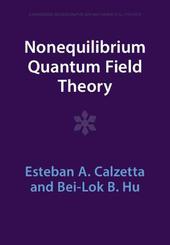
|
Nonequilibrium Quantum Field Theory
Paperback / softback
Main Details
| Title |
Nonequilibrium Quantum Field Theory
|
| Authors and Contributors |
By (author) Esteban A. Calzetta
|
|
By (author) Bei-Lok B. Hu
|
| Series | Cambridge Monographs on Mathematical Physics |
|---|
| Physical Properties |
| Format:Paperback / softback | | Pages:552 |
|
| ISBN/Barcode |
9781009290029
|
| Classifications | Dewey:530.143 |
|---|
| Audience | |
|---|
| Edition |
Revised edition
|
| Illustrations |
Worked examples or Exercises
|
|
Publishing Details |
| Publisher |
Cambridge University Press
|
| Imprint |
Cambridge University Press
|
| Publication Date |
9 February 2023 |
| Publication Country |
United Kingdom
|
Description
Bringing together the key ideas from nonequilibrium statistical mechanics and powerful methodology from quantum field theory, this 2008 book captures the essence of nonequilibrium quantum field theory. Beginning with the foundational aspects of the theory, the book presents important concepts and useful techniques, discusses issues of basic interest, and shows how thermal field, linear response, kinetic theories and hydrodynamics emerge. It also illustrates how these concepts are applied to research topics including nonequilibrium phase transitions, thermalization in relativistic heavy ion collisions, the nonequilibrium dynamics of Bose-Einstein condensation, and the generation of structures from quantum fluctuations in the early Universe. This self-contained book is a valuable reference for graduate students and researchers in particle physics, gravitation, cosmology, atomic-optical and condensed matter physics. It has been reissued as an Open Access publication on Cambridge Core.
Reviews'... a very well written book which covers thoroughly various formalisms for studying nonequilibrium statistical mechanics and nonequilibrium.quantum field theory ... The authors have written many of the seminal papers and the book is a masterpiece of pedagogy, explaining and resolving very clearly many of the technical issues that had to be overcome in the development of this subject. It should prove essential reading to anyone venturing to work in this important new field.' Fred Cooper, Program Director of Theoretical Physics, National Science Foundation
|